#haccp certification
Text
#iso#iso 9001#iso certificate online#iso 17020 accreditation#iso padre#isocertification#iso9001#haccp certification#haccptraining#haccp#haccpcourses#foods#foodstagram#foodsafety#foodsecurity#food stim#foodmyheart#safety#health and safety#double standards#high standards#i have standards
0 notes
Text
haccp certification
Understanding the Importance of HACCP Certification in Ensuring Food Safety
Introduction:
In the realm of food production and processing, ensuring safety is paramount. Hazard Analysis and Critical Control Points (HACCP) certification stands as a beacon of assurance in this regard. This systematic approach to food safety management has become indispensable for food businesses worldwide. By identifying and controlling potential hazards throughout the production process, HACCP certification not only safeguards consumer health but also enhances trust and credibility in the industry. In this article, we delve into the significance of HACCP certification, exploring its principles, implementation, benefits, and future implications.
The Principles of HACCP Certification
At the core of HACCP certification lie seven fundamental principles. These principles serve as a guideline for developing and implementing effective food safety management systems. Understanding these principles is crucial for any food business aspiring to achieve HACCP certification. The principles include conducting hazard analysis, identifying critical control points, establishing critical limits, implementing monitoring procedures, establishing corrective actions, verifying the system, and maintaining records. Each principle plays a vital role in ensuring that potential hazards are identified, controlled, and monitored throughout the food production process.
Implementation of HACCP Certification
Implementing HACCP certification involves a systematic approach tailored to the specific needs of each food business. It begins with the formation of a multidisciplinary HACCP team comprising individuals with expertise in various aspects of food production, including microbiology, food technology, and quality assurance. The team collaborates to conduct a thorough hazard analysis, identifying biological, chemical, and physical hazards that may occur at each stage of production. Subsequently, critical control points (CCPs) are determined, and critical limits are established to control these hazards. Monitoring procedures are then implemented to ensure that CCPs are effectively managed, with corrective actions established to address deviations from critical limits.
Benefits of HACCP Certification
The benefits of HACCP certification extend beyond mere compliance with regulatory requirements. For food businesses, obtaining HACCP certification signifies a commitment to excellence in food safety management. By proactively identifying and controlling hazards, businesses can minimize the risk of foodborne illnesses, thereby safeguarding consumer health and well-being. Moreover, HACCP certification enhances marketability and competitiveness, as it demonstrates adherence to internationally recognized standards of food safety. Additionally, achieving HACCP certification can lead to cost savings by reducing the likelihood of product recalls, legal liabilities, and reputation damage associated with food safety incidents.
Future Implications of HACCP Certification
As the global food industry continues to evolve, the importance of HACCP certification is expected to grow exponentially. With consumers becoming increasingly discerning about the safety and quality of the food they consume, demand for HACCP-certified products is likely to surge. Moreover, regulatory bodies are placing greater emphasis on HACCP certification as a prerequisite for food manufacturing and export. In response to these trends, food businesses must remain vigilant in upholding HACCP principles and continually improving their food safety management systems. Embracing emerging technologies such as blockchain and IoT can further enhance traceability and transparency throughout the food supply chain, reinforcing the integrity of HACCP-certified processes.
Conclusion:
In conclusion, HACCP certification serves as a cornerstone of food safety assurance, providing a systematic framework for identifying, evaluating, and controlling hazards in the food production process. By adhering to HACCP principles, food businesses can mitigate risks, enhance consumer trust, and gain a competitive edge in the global marketplace. As the food industry embraces innovation and globalization, the significance of HACCP certification will only continue to grow, reinforcing its status as a gold standard for food safety management.
0 notes
Text
Benefits Of HACCP Certification
HACCP is a food safety management system that helps organizations to identify and control food safety hazards. It is a preventative approach to food safety that focuses on identifying and preventing biological, chemical, and physical hazards in the food production process. Certification to HACCP standards demonstrates to customers that your organization is committed to food safety and provides a framework for continuous improvement. There are numerous benefits of HACCP certification for businesses, some are mentioned below.
Improved Food Safety
HACCP certification can help to improve food safety by ensuring that food businesses have implemented proper food safety procedures. These procedures can help to prevent foodborne illnesses, which can be caused by bacteria, viruses, or toxins. By implementing HACCP procedures, businesses can help to ensure that their products are safe for consumption.
Enhanced Reputation
HACCP certification can help to enhance the reputation of businesses. Consumers are becoming increasingly concerned about food safety, and as such, are more likely to purchase products from businesses that have implemented proper food safety procedures. Certification to HACCP standards can help businesses to demonstrate their commitment to food safety and gain a competitive advantage.
Increased Efficiency
HACCP certification can help to increase the efficiency of businesses. By implementing HACCP procedures, businesses can streamline their food production process and reduce the likelihood of errors. This can lead to increased productivity and reduced costs. Moreover, businesses that have implemented HACCP procedures often find that their products have a longer shelf life.
Reduced Costs
HACCP certification can help to reduce costs. By streamlining the food production process and reducing the likelihood of errors, businesses can save money on raw materials, labour, and other costs associated with food production. In addition, businesses can save money on product liability insurance and other costs associated with food safety problems.
Improved Customer Satisfaction
HACCP certification can help to improve customer satisfaction. Customers are becoming increasingly concerned about food safety, and as such, are more likely to purchase products from businesses that have implemented proper food safety procedures. Certification to HACCP standards can help businesses to demonstrate their commitment to food safety and gain a competitive advantage.
HACCP Certification Requirements
There are a number of HACCP certification requirements that businesses must meet in order to be certified to HACCP standards. These HACCP certification requirements vary depending on the type of business, but typically include the following:
Developing and implementing a food safety management system
Identifying hazards associated with the company's products
Establishing critical control points in the production process
Monitoring procedures to ensure that critical control points are being met
Corrective action procedures to be taken if a critical control point is not being met
Documentation and record-keeping procedures
Conclusion
HACCP certification can offer numerous benefits to businesses, including improved food safety, enhanced reputation, increased efficiency, and reduced costs. If your business is interested in HACCP certification, it is important to familiarize yourself with the HACCP certification requirements. Once you have met the requirements, you can begin the process of certification.
0 notes
Text
How Does HACCP Provide Advantages?
Discover the profound advantages of HACCP (Hazard Analysis and Critical Control Points) certification with our in-depth guide on Registrationwala's Knowledge Base. Explore why implementing HACCP is crucial for ensuring food safety, regulatory compliance, and operational excellence. Learn about the step-by-step process, industry relevance, and real-world applications of HACCP. Stay informed and take a proactive approach to quality assurance in your business.
0 notes
Text
Culinary Guardians Empower Your Team with HACCP Training
I. Introduction
In the intricate world of food production, prioritizing the safety of our consumables is paramount. This is where HACCP, or Hazard Analysis and Critical Control Points, takes center stage. This article will provide a concise yet comprehensive exploration of HACCP, shedding light on its pivotal role in maintaining food safety. Additionally, we will outline key components and themes…

View On WordPress
0 notes
Text
Briefly Explain About HACCP Certification
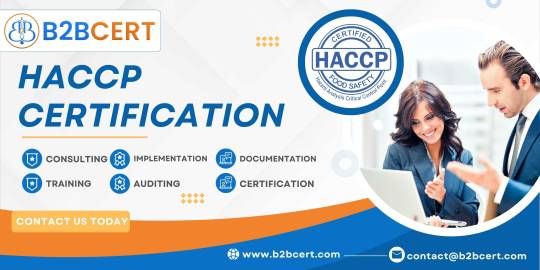
HACCP Certification in Netherlands is essential to guaranteeing food safety and adhering to global regulations. In the nation, there are many respectable certification organizations in operation, such as Kiwa, Bureau Veritas Certification, and Lloyd's Register Quality Assurance. These organizations assist companies in identifying and reducing risks throughout the production process by evaluating and validating food safety management systems. Obtaining HACCP certification enhances consumer trust and promotes international trade by demonstrating a dedication to quality and safety. The Netherlands' food-related sectors must work with accredited organizations to comply with legal requirements and maintain the highest standards of food safety.
Benefits of HACCP Certification in Netherlands
Compliance with Regulations: By establishing conformance to national and international standards for food safety, HACCP Implementation in Netherlands shows a dedication to satisfying legal obligations.
Enhanced Food Safety: By identifying, assessing, and controlling possible hazards in the food production process, the use of HACCP principles benefits to an overall improvement in food safety.
Market Access: HACCP certification is a requirement for many international retailers and distributors, which opens up new markets and promotes cross-border trade.
Continuous Improvement: To assure continued compliance and growth to changes in the food sector, HACCP promotes a culture of continuous improvement through frequent monitoring, reviews, and updates.
Competitive Advantage: Organizations that have earned their HACCP certification can stand out from the competition by demonstrating their dedication to producing safe and high-quality food.
Supplier and Customer Confidence: Stronger ties and collaborations across the supply chain are fostered by HACCP certification, which increases confidence among both vendors and consumers.
Cost of HACCP Certification in Netherlands
Depending on the firm size, industry, and certification body of choice, there are differences in the cost of obtaining a HACCP Cost in Netherlands. Generally, the whole investment is made up of staff training costs, certification fees, and consulting fees for system growth. Certifying bodies may charge several thousand euros or a few thousand euros. To receive customized quotes, businesses can get in touch with many certification bodies. Although the cost varies, being HACCP certified is thought to be an important purchase in food safety, legal compliance, and effectiveness in the market, with possible long-term advantages for consumer confidence and access to world markets.
Process of HACCP Certification in Netherlands
Awareness and Preparation: Recognize HACCP requirements and principles.Ensure that important staff members are informed and committed.
Define scope: Give a clear description of the items and processes that the HACCP plan will cover in order to establish its scope.
Safety Analysis: Identify the physical, chemical, and biological risks in the manufacturing process by conducting a thorough hazard analysis.
Finding the Critical Control Points (CCPs): Identify the key control points where you can use control methods to stop, get rid of, or lessen risks.
Establishing Critical Boundaries: For every important control point, establish critical limits that specify acceptable control measure levels.Establish monitoring protocols to make sure that conditions at crucial control points are routinely observed and documented.
Documentation: Create thorough documentation, such as the CCPs, hazard analyses, HACCP plans, monitoring logs, and reports on corrective actions.
Audit and Certification: Submit to an on-site audit by the certifying authority to evaluate how well the HACCP system is being implemented. The certification organization decides whether to grant HACCP certification based on the audit result.
How to get HACCP Consultants in Netherlands
If you would like more information on How to Find HACCP Consultants Services in Netherlands or if you need assistance with HACCP training or consulting services in the Netherlands, please visit our company's official site at www.b2bcert.com or send an email with your requirements to [email protected]. At B2Bcert, we prioritize value added in order to comprehend requirements and choose the most cost-effective and precise procedure for your business to obtain HACCP certification.
0 notes
Text
HACCP stands for Hazard Analysis and Critical Control Points. HACCP is defined as globally recognized methods of recognizing, controlling, and leading crucial hazards connected with the production of food, counting biological, physical, and chemical.
The HACCP system emphasizes prevention over responding to risks. This process is widely utilized in the food manufacturing industry and serves as the foundation for prominent certifications including FSSC 22000, BRCGS, and SQF certifications as well as the Global Food Safety Initiatives.
To serve them, many large merchants and fast-service restaurants want a HACCP food safety certification that has been GFSI-benchmarked. Thus, one of the most important parts of a strong food safety system is creating a HACCP plan if you want to sell your goods to big businesses.
#haccp#haccp training#haccp auditor training#haccp documents#haccp food safety certification#haccp certification#haccp auditor training online
0 notes
Text
"Safeguarding Consumers: The Role of HACCP Certification in Oman's Food Industry"
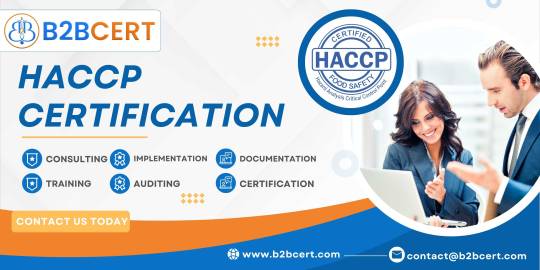
Hazard Analysis and Critical Control Point is referred to as HACCP. A standard called HACCP is used to lower the possibility of food safety issues.
Potential hazards must be recognized and controlled at certain stages of the process in order to implement a HACCP system. This covers risks that are chemical, biological, or physical. HACCP can be used by any business that produces food products to reduce or eliminate risks to food safety.
HACCP certification in Oman proves to consumers that you are dedicated to maintaining food, ingredient, and beverage safety throughout the manufacturing process. You will also obtain the information required for stakeholder and regulatory authority inspections by using its evidence-based methodology. Adhering to HACCP standards will: Revolutionize your brand.
What are the uses of HACCP Certification in Oman?
Minimizing Risks to Food Safety:
The primary advantages of HACCP in Oman are as follows. The food is protected from any physical, chemical, or biological risks thanks to the HACCP standards' compliance. Along with maintaining proper temperature requirements, this also helps to ensure personal hygiene.
ensures certain adherence to the Food Laws:
India's Food Safety and Standards Act regulates the country's food laws. The business can more easily achieve the FSSAI by using the HACCP to help verify that food and safety requirements are being followed.
Aids in reducing the risks associated with food safety across the supply chain:
Whether food is produced, purchased, distributed, stored, consumed, or handled in any other way throughout the supply chain, HACCP helps to guarantee food safety.
Loyalty of Customers:
Customers feel confident when they purchase food that complies with HACCP safety requirements since they don't have to worry about becoming sick. Customers are encouraged to choose that specific food industry as a result.
Improved Business Goodwill:
Because it is seen as more dependable than other food sectors, the HACCP-compliant company has an advantage over its rivals in the food sector.
Better Financial Decisions:
A company's ability to raise capital is facilitated by its positive reputation in the marketplace, which draws superior national and international investors.
How much is the HACCP Cost in Oman?
HACCP Cost in Oman varies according to the kind of product, size of the company, complexity of the manufacturing process, and the certifying organization's preferences. Industry-specific differences in compliance levels have an impact on certification costs. The choice of certifying authority and related services raises the total cost of HACCP certification.
What is the process of HACCP Audit in Oman?
Getting ready and reviewing the documentation:
The first step in the process of HACCP Audit in Oman is creating the HACCP paperwork, which includes the essential control points, preventative actions, and hazard analysis. The auditing body checks the conformity and sufficiency of these documents.
On-Site Evaluation:
Auditors come to the location to perform an on-site examination. They watch how things are done, check to see if workers are adhering to written protocols, and make sure that critical control points are being observed as directed.
Examining the Records:
Auditors carefully review all documentation and information pertaining to the HACCP plan's execution. This covers keeping an eye on logs, taking corrective action when variances occur, and putting any preventative measures in place.
Conversations and Interviews:
Auditors conduct interviews or have talks with key persons in order to obtain information about how the HACCP plan is really implemented in practice. They might ask about protocols, instruction, and comprehension of the plan.
Evaluation and Report Writing:
HACCP compliance at the site is evaluated by auditors based on the data they have collected. A thorough report is produced detailing the results, any non-compliance areas, and, if needed, suggestions for enhancements.
How to get the HACCP Consultants Services in Oman?
In order to obtain HACCP Certification Consultants in Oman, you should think about getting in contact with b2bcert, a well-known global company that provides audits, consultations, verifications, and all-around support globally. For simple access to their services, go to [email protected] for more details.
0 notes
Text
The Benefits of HACCP Certification: Why Get Certified?
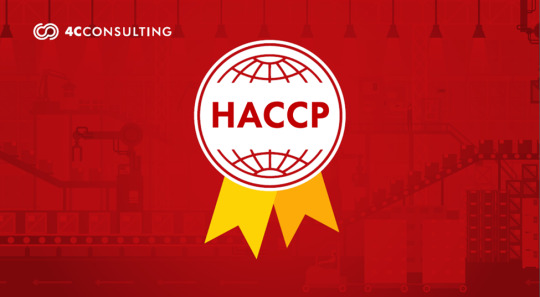
In the world of food safety, the HACCP (Hazard Analysis and Critical Control Points) certification stands as a powerful tool to ensure the quality and safety of food products. As a trusted ISO certification provider in India, 4C Consulting is here to guide you through the significant advantages of obtaining HACCP certification. In this blog, we will unravel the reasons why your organization should consider getting certified, shedding light on the comprehensive benefits that come with prioritizing food safety.
What is HACCP Certification?
HACCP, or Hazard Analysis and Critical Control Points, is a systematic approach to identifying, evaluating, and controlling food safety hazards. HACCP certification is a recognition that an organization has implemented and maintained an effective food safety management system based on HACCP principles. This certification is especially crucial in the food industry, where ensuring the safety of products is non-negotiable.
Why HACCP Certification Matters :
Ensures Food Safety: HACCP certification is all about making sure the food we eat is safe. It helps prevent hazards that could harm consumers, ensuring that the food production process is under control.
Compliance with Regulations: Many countries and regions have strict regulations regarding food safety. HACCP certification ensures that your organization complies with these regulations, helping you avoid legal issues and safeguarding your reputation.
Builds Consumer Trust: Consumers want to know that the food they buy is safe to eat. HACCP certification is like a stamp of approval that tells customers, "Hey, we care about your safety, and our food is top-notch."
Reduces Product Recalls: Product recalls can be a nightmare for any food business. HACCP helps prevent issues in the production process, reducing the likelihood of recalls and protecting your brand image.
Increases Market Access: Many retailers and partners prefer working with suppliers who have HACCP certification. It opens doors to new markets and collaborations, giving your organization a competitive edge.
Enhances Operational Efficiency: Implementing HACCP principles improves the efficiency of your operations. It streamlines processes, reduces waste, and ensures that resources are used effectively in the production of safe food.
Benefits of HACCP Certification :
Identification and Prevention of Hazards: HACCP certification requires a thorough analysis of potential hazards in the food production process. By identifying these hazards and implementing control measures, the risk of contamination or safety issues is significantly reduced.
Customized for Your Organization: HACCP is not a one-size-fits-all approach. It allows organizations to tailor their food safety management system to their specific processes, making it adaptable and effective for different types of food businesses.
Continuous Improvement: HACCP is a dynamic system that encourages continuous improvement. Regular reviews and updates ensure that the food safety management system remains effective and up-to-date with industry best practices.
Employee Training and Awareness: HACCP certification involves training employees to understand and implement food safety measures. This creates a culture of awareness and responsibility, ensuring that everyone in the organization plays a role in maintaining food safety standards.
Cost Savings: While implementing HACCP may require an initial investment, it often leads to long-term cost savings. By preventing issues and ensuring efficient processes, organizations can reduce the financial impact of recalls and incidents.
Global Recognition: HACCP certification is recognized globally, making it an essential credential for organizations involved in international food trade. It opens up opportunities for export and demonstrates a commitment to global food safety standards.
How 4C Consulting Can Help You Achieve HACCP Certification :
Now that we understand the importance of HACCP certification, let's explore how 4C Consulting, as your trusted ISO certification provider in India, can guide your organization through the process.
Initial Assessment: We start by assessing your current food safety practices. This helps identify areas of strength and areas that need improvement to meet HACCP requirements.
Customized Implementation Plan: Based on the assessment, we create a personalized plan outlining the steps your organization needs to take to align with HACCP principles. This plan serves as a roadmap for the certification journey.
Employee Training: Recognizing the importance of your team, we provide comprehensive training programs to ensure that everyone is well-prepared to implement and maintain HACCP standards.
Documentation and Process Enhancement: Our experts assist in developing the necessary documentation, including HACCP plans and procedures. We work with you to optimize processes, ensuring they align seamlessly with HACCP requirements.
Internal Audits: Before the final certification audit, we help your organization conduct internal audits to identify and address any potential non-conformities. This proactive approach ensures readiness for the certification assessment.
Certification Audit Support: The final step involves a certification audit conducted by an accredited body. 4C Consulting provides support during this audit, helping your organization showcase compliance with HACCP standards.
Conclusion :
In conclusion, obtaining HACCP certification with 4C Consulting is not just about meeting standards; it's about prioritizing the safety of consumers and ensuring the success and reputation of your food business. By simplifying the benefits and processes, we aim to make the journey towards HACCP certification accessible and achievable for organizations in India. Choose 4C Consulting as your partner in ensuring food safety, and let's work together to elevate your organization to new heights of excellence.
Implement HACCP with 4C :
To help your organization receive all the benefits of HACCP, our team of Food safety certified consultants is equipped to provide you exceptional consulting as well as training. Our team of experts at 4C has helped 150+ clients gain international recognition, credibility, and trust from customers, powered by 5000+ training hours. For HACCP implementation and certification in your organization, contact us now @www.4cpl.com
#haccp#haccp full form#haccp principles#haccp certification#haccp meaning#haccp critical control points#what is haccp#haccp certification consultant#haccp training
1 note
·
View note
Text
HACCP Certification in Food Businesses
HACCP Certification in Mumbai - Hazard Analysis and Critical Control Points, is a proactive, scientifically based method of guaranteeing food safety. HACCP reduces the risk of foodborne illnesses by methodically detecting, assessing, and controlling hazards at crucial stages in the food production process. This approach, which may be used in a variety of food business sectors, is a move in the direction of risk reduction and prevention. In this research, we explore the concepts and methods of HACCP, emphasizing how it has transformed food safety laws. Join us on a journey to learn why HACCP is such a useful tool for businesses committed to offering healthful food to people everywhere.
HACCP Certification's Advantages for Businesses
Improved Product Quality : The main goal of HACCP is to maintain consistent product quality by preventing changes and deviations in the production process. This results in higher-quality products that either meet or exceed consumer expectations.
Competitive Advantage : HACCP Certification in Nigeria helps businesses stand out from competitors. It is a powerful marketing tool that attracts discriminating clients and business partners by showcasing a commitment to food safety and quality.
Cost savings : HACCP can save money in the long run, even though there may be an initial cost involved in implementation. Preventing product recalls and contamination incidents can save businesses a significant amount of money and maintain their profitability.
Regulation Compliance : HACCP is typically mandated by regulations in the food industry. The application of HACCP helps businesses comply with local, national, and international food safety laws and standards by promoting legal adherence and preventing possible legal issues.
Which kind of companies benefit from obtaining a HACCP certification ?
Food Manufacturers: For businesses that manufacture food products whether they are processing, packaging, or labeling HACCP accreditation offers a number of benefits. This covers companies that produce food, both processed and unprocessed.
Catering and Food Service Providers: Restaurants, cafeterias, catering companies, and other food service providers can improve their food safety protocols and ensure the safety of the food they serve by implementing HACCP principles.
Farmers and Agricultural Producers: Farms and other agricultural operations can benefit from HACCP by incorporating safety measures into the growing and harvesting processes, particularly for fresh produce and other raw agricultural products.
Hospitality Industry: By incorporating HACCP Certification in Zimbabwe in Hotels, resorts, and other hospitality businesses it may guarantee the security of the food served to guests by including food service operations.
How much does it cost to get certified as HACCP?
A multitude of factors, such as industry, business size, and preferred certifying organization, influence the cost of obtaining HACCP certification.The quantity of money required depends on a few factors unique to your company. At B2BCert, we specialize in tailoring certification solutions to your specific needs. For customized price quotes and information on how B2BCert's HACCP Certification can propel your business to new heights, get in contact with us.
How to get HACCP Consultants?
Our experienced consultants are available to assist you at every stage, enabling you to successfully manage the challenges associated with HACCP certification. It's easy to get in touch with us; just drop us an email or use the contact form on our website. Our HACCP Consultants in Chad may assist if you need a bespoke estimate, have any queries about the certification process, or just want expert advice. Reach out to us immediately to elevate your food safety standards with ease.
0 notes
Text
Benefits Of HACCP Certification
HACCP is a food safety management system that helps organizations to identify and control food safety hazards. It is a preventative approach to food safety that focuses on identifying and preventing biological, chemical, and physical hazards in the food production process. Certification to HACCP standards demonstrates to customers that your organization is committed to food safety and provides a framework for continuous improvement. There are numerous benefits of HACCP certification for businesses, some are mentioned below.
Improved Food Safety
HACCP certification can help to improve food safety by ensuring that food businesses have implemented proper food safety procedures. These procedures can help to prevent foodborne illnesses, which can be caused by bacteria, viruses, or toxins. By implementing HACCP procedures, businesses can help to ensure that their products are safe for consumption.
Enhanced Reputation
HACCP certification can help to enhance the reputation of businesses. Consumers are becoming increasingly concerned about food safety, and as such, are more likely to purchase products from businesses that have implemented proper food safety procedures. Certification to HACCP standards can help businesses to demonstrate their commitment to food safety and gain a competitive advantage.
Increased Efficiency
HACCP certification can help to increase the efficiency of businesses. By implementing HACCP procedures, businesses can streamline their food production process and reduce the likelihood of errors. This can lead to increased productivity and reduced costs. Moreover, businesses that have implemented HACCP procedures often find that their products have a longer shelf life.
Reduced Costs
HACCP certification can help to reduce costs. By streamlining the food production process and reducing the likelihood of errors, businesses can save money on raw materials, labour, and other costs associated with food production. In addition, businesses can save money on product liability insurance and other costs associated with food safety problems.
Improved Customer Satisfaction
HACCP certification can help to improve customer satisfaction. Customers are becoming increasingly concerned about food safety, and as such, are more likely to purchase products from businesses that have implemented proper food safety procedures. Certification to HACCP standards can help businesses to demonstrate their commitment to food safety and gain a competitive advantage.
HACCP Certification Requirements
There are a number of HACCP certification requirements that businesses must meet in order to be certified to HACCP standards. These HACCP certification requirements vary depending on the type of business, but typically include the following:
Developing and implementing a food safety management system
Identifying hazards associated with the company's products
Establishing critical control points in the production process
Monitoring procedures to ensure that critical control points are being met
Corrective action procedures to be taken if a critical control point is not being met
Documentation and record-keeping procedures
Conclusion
HACCP certification can offer numerous benefits to businesses, including improved food safety, enhanced reputation, increased efficiency, and reduced costs. If your business is interested in HACCP certification, it is important to familiarize yourself with the HACCP certification requirements. Once you have met the requirements, you can begin the process of certification.
0 notes
Text
Certificationconsultancy.com is All Set to Re-launched the HACCP Documents for Food Manufacturers
The editable HACCP documentation kit – one of the most demanded products for food processing organizations, has recently been re-launched by Certificationconsultancy.com with additional editable templates. The HACCP documents are intended to assist food producers and processors in expediting the HACCP documentation process for quick and efficient certification.
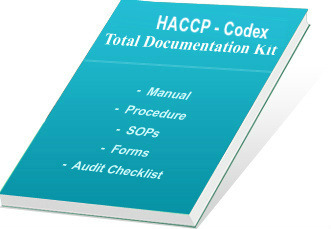
#haccp#haccp certification#haccp documents#editable haccp documents#ready-to-use haccp documents#haccp manual#haccp audit checklist
1 note
·
View note
Text
Ensuring Food Safety Excellence: A Guide to HACCP Certification
A blog regarding HACCP certificaiton
HACCP Certification in Zambia stands for Hazard Analysis and Critical Control Points, and HACCP certification is a systematic approach to food safety that aims to prevent, identify, and control potential hazards in food production and handling processes. The certification is awarded to businesses that implement and adhere to the principles of the HACCP system.
HACCP certification is often a requirement for businesses in the food industry, and it is recognized internationally as a benchmark for ensuring food safety. Obtaining HACCP certification demonstrates a commitment to producing safe and high-quality food products, which can enhance consumer trust and facilitate market access. Certification is typically awarded by accredited certification bodies after a thorough assessment of a company's HACCP system and practices.
How HACCP Certification Elevates Food Industry Standards
HACCP Implementation in Senegal offers numerous benefits to food businesses, contributing to the overall safety, quality, and reputation of their products. Here are some key advantages:
Enhanced Food Safety: HACCP certification helps identify and control potential hazards in the food production process, leading to safer products for consumers.
Compliance with Regulations: Many regulatory bodies and food safety standards require HACCP certification. Achieving and maintaining certification ensures compliance with these regulations, reducing the risk of legal issues.
Improved Consumer Confidence: Consumers are increasingly conscious of food safety. HACCP certification signals a commitment to producing safe and high-quality products, building trust and confidence among consumers.
Market Access and Expansion: HACCP certification is often a prerequisite for entering new markets. Having the certification opens doors to international trade by meeting global food safety standards.
Risk Mitigation: Identifying and controlling potential hazards in the production process reduces the risk of foodborne illnesses, product recalls, and other crises, protecting both consumers and the business.
Demystifying the Affordability of HACCP Compliance
HACCP Cost in Bangalore can vary depending on several factors, including the size and complexity of the organization, the scope of its operations, and the certification body chosen. Here are some elements that contribute to the overall cost:
Consultancy Services: Many organizations seek the assistance of consultants to help them develop and implement their HACCP system. The cost of hiring a consultant depends on their expertise and the level of support required.
Employee Training: Training employees on HACCP principles and practices is a crucial component of certification. Costs may include materials, trainers' fees, and any associated travel expenses.
System Development: Creating and implementing a HACCP plan involves time, resources, and potential changes to existing processes. Costs may be associated with process modifications, equipment upgrades, or new technologies.
Documentation and Record-Keeping: Maintaining accurate records and documentation, as required by HACCP, may involve investing in software, documentation tools, or additional personnel.
A Practical Approach to Achieving HACCP Certification
HACCP Services in Iraq involves a systematic approach to ensuring food safety in your organization. Here's a general guide on how to obtain HACCP certification:
Understand HACCP Principles:
Familiarize yourself and your team with the principles of HACCP. Understand the seven principles of HACCP, which include conducting a hazard analysis, determining critical control points, establishing critical limits, monitoring procedures, corrective actions, verification procedures, and record-keeping.
Identify a HACCP Team:
Form a HACCP team that includes individuals with expertise in different aspects of the food production process. This may include representatives from production, quality control, maintenance, and management.
Conduct a Hazard Analysis:
Identify and assess potential hazards in the entire food production process. This includes biological, chemical, and physical hazards. Determine the likelihood of occurrence and the severity of the hazards.
Determine Critical Control Points (CCPs):
Based on the hazard analysis, identify critical control points in the process where control measures can be applied to prevent, eliminate, or reduce hazards to acceptable levels.
Best HACCP Certification Consultant for your business
Discover top-notch HACCP Certification Consultants in Kenya with B2BCERT, a globally recognized service provider. If you need expert advice for HACCP certification or help to incorporate it into your business, our skilled team is prepared to provide top-tier services. Acknowledging the hurdles businesses encounter, B2BCERT provides beneficial certification audits to aid in surmounting challenges and boosting overall business efficiency. Achieve immediate acknowledgment with B2BCERT certification, enabling seamless interaction with influential decision-makers. Opt for B2BCERT as your go-to choice for HACCP certificate enrollment.
#haccp certification#HACCP certification in iraq#HACCP certification in senegal#haccp certification in Bangalore
0 notes
Text
The Benefits of HACCP Certification for Your Food BusinessTop of Form
In today's dynamic business landscape, ensuring the safety and quality of your products is paramount. One way to achieve this is through HACCP (Hazard Analysis and Critical Control Points) certification. At 4C Consulting Private Limited, we understand the critical importance of HACCP certification for your business, and here are some key benefits you can expect when partnering with us:
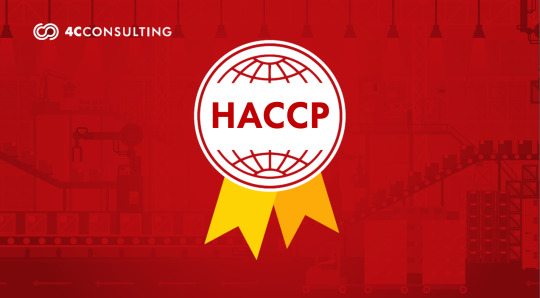
Enhanced Food Safety: HACCP certification ensures that your food products are produced, handled, and stored in a way that minimizes the risk of contamination or safety hazards. This certification demonstrates your commitment to delivering safe food to consumers.
Compliance and Legal Protection: Meeting HACCP standards not only helps you comply with food safety regulations but also offers legal protection in the event of a food safety issue. It can reduce your liability and potential legal consequences.
Market Access: Many retailers and international markets require HACCP certification as a prerequisite for doing business. Certification with 4C Consulting Private Limited can open doors to new markets and business opportunities.
Improved Reputation: HACCP certification is a powerful symbol of trust. Displaying the HACCP logo on your products and marketing materials reassures consumers that you prioritize their health and well-being.
Efficiency and Cost Savings: Through systematic hazard analysis and control measures, HACCP can help streamline your production processes, reduce waste, and minimize the risk of costly recalls.
Continuous Improvement: HACCP is a proactive approach to food safety, promoting ongoing monitoring and improvement. It ensures that your organization remains vigilant and responsive to emerging risks.
Employee Engagement: Employees trained in HACCP principles become more aware of food safety issues, contributing to a culture of safety within your organization.
Partnering with 4C Consulting Private Limited for HACCP certification means gaining a competitive edge, protecting your brand, and safeguarding your customers. Contact us today to embark on a journey toward safer, higher-quality products and a brighter future for your business.
1 note
·
View note
